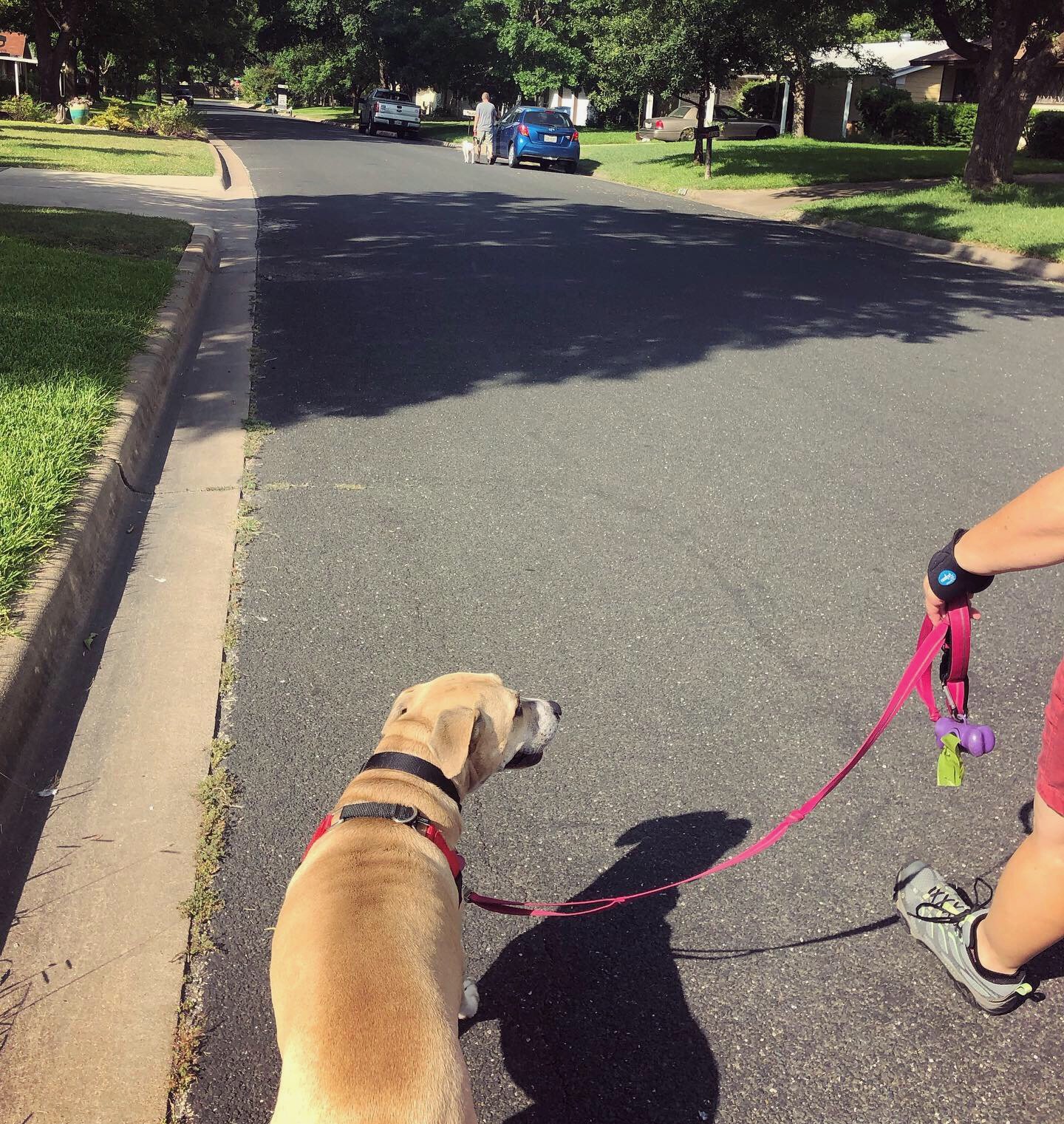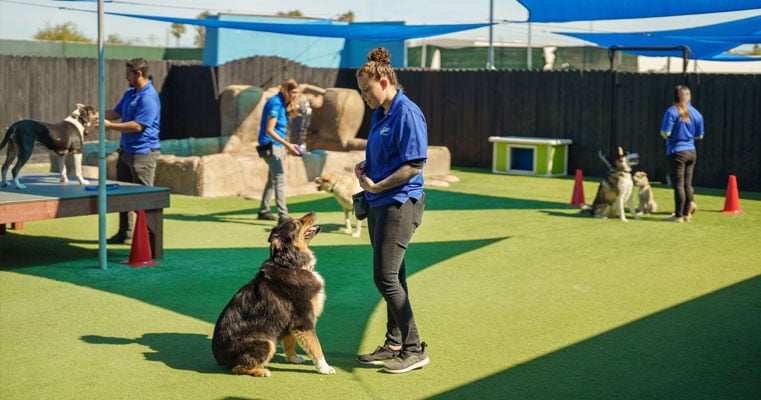Unlock Your Canine's Possible: Proven Pet Training Methods for Success
Efficient pet training is a nuanced process that depends upon understanding canine actions and using clinically backed approaches. dog training near me. By integrating positive reinforcement, establishing clear commands, and focusing on socializing, dog proprietors can cultivate a productive connection with their pet dogs. However, difficulties typically arise that require tailored services and a client strategy. Exploring these shown methods discloses not only the possibility for behavior improvement but likewise the deeper bond that can be developed in between owner and dog. What important techniques must be taken into consideration to absolutely open your pet's capacity?
Understanding Pet Dog Habits
Recognizing dog behavior is crucial for effective training and promoting a favorable partnership between dogs and their proprietors. A detailed understanding of canine body movement, articulations, and social interactions is crucial for acknowledging their requirements and emotions. Pets interact mostly with non-verbal hints; for instance, a wagging tail might suggest excitement, while pinned ears can signify fear or submission.
:strip_icc()/young-woman-training-her-dog-686725227-588bab6d5f9b5874ee8bcef5.jpg)
Furthermore, environmental elements play a significant role fit a pet dog's actions. Adjustments in regular, brand-new surroundings, or the visibility of unfamiliar people can result in tension or stress and anxiety in dogs. Identifying these triggers enables owners to mitigate unfavorable reactions and establish ideal training strategies.
Inevitably, a deep understanding of dog habits lays the structure for effective training methods, enhancing both behavior and the overall bond between the canine and its proprietor. Dog training. This knowledge is indispensable for cultivating a well-adjusted, satisfied canine buddy
Favorable Support Strategies
Effective training relies greatly on positive reinforcement strategies, which have actually been shown to generate significant outcomes in forming desired habits in dogs. This approach includes rewarding a pet for exhibiting particular habits, thus boosting the probability that these actions will be duplicated. Benefits can take numerous types, consisting of treats, praise, toys, or play, depending upon what encourages the specific canine.

It is necessary to slowly eliminate benefits as the canine discovers the behavior, transitioning to recurring reinforcement. This method maintains the actions gradually while preventing reliance on consistent rewards. By concentrating on positive support, instructors can cultivate a relying on relationship with their pets, advertising a healthy and balanced and cooperative training atmosphere that enhances general obedience and efficiency.
Developing Constant Commands
An essential aspect of effective dog training is the facility of consistent commands. Uniformity in commands is essential for efficient interaction between the dog and the instructor. When commands are uniform, dogs discover to associate particular words with wanted behaviors, which increases the training procedure and enhances understanding.
To develop regular commands, it is necessary that all member of the family use the exact same terminology and gestures. For instance, if someone uses "rest" while an additional says "take a seat," it can develop confusion for the canine. Select clear, unique words for commands and make sure everyone involved in the pet's training follows these choices.
Furthermore, repeating is vital. Strengthen commands through frequent method, making certain that the canine receives adequate opportunities to react appropriately. When a canine effectively adheres to a command, prompt positive support ought to adhere to. This might be in the form of deals with, appreciation, or play, strengthening the link between the command and the activity.
Finally, be client. Establishing constant commands takes some time and effort. With devotion and clarity, you will certainly help your canine create a solid understanding of expectations, inevitably bring about a mannerly companion.
Socialization and Exposure
Mingling a pet dog is essential for cultivating a try this website well-adjusted and positive friend. This process involves revealing your pet to a range of atmospheres, individuals, and other pets to establish their social skills and versatility. Early socialization, preferably between the ages of three to fourteen weeks, is critical, as it lays the foundation for a pet dog's future habits.
Throughout socialization, aim to supply positive experiences in different setups, such as parks, active roads, and homes with other family pets. Present your canine to dog whining in crate various stimulations, including audios, views, and smells, guaranteeing that each encounter is gratifying. This direct exposure aids minimize worry and stress and anxiety, paving the way for a more durable canine.
Participating in controlled team play sessions with various other pet dogs can likewise improve social abilities, teaching your pet suitable communications and limits. Constantly monitor your pet's convenience degree throughout these experiences, slowly raising direct exposure as their confidence expands. Keep in mind, the goal is to develop a well-shaped animal that grows in diverse scenarios, advertising an unified connection with both human beings and other animals. Focusing on socializing will significantly add to your dog's overall happiness and behavior throughout their life.
Overcoming Common Training Challenges

Canines may have a hard time to focus in unfamiliar or active setups. Slowly desensitize your dog to distractions by starting training in a quiet environment and gradually introducing even more stimulations as they come to be efficient.
Furthermore, behavioral concerns like leaping or extreme barking can become aggravating. Address these by showing alternate actions, such as sitting comfortably when greeting visitors. Uniformity and patience are important; enhance preferred actions continually and stay clear of abuse, which can result in complication.
Finally, acknowledge that each pet dog is unique, and training timelines may differ. Dressmaker your technique to your pet's specific requirements, and look for specialist guidance if required. With determination and the right approaches, overcoming these difficulties can result in a trained, delighted canine friend.
Conclusion
To conclude, opening anchor a pet's possible necessitates a comprehensive technique that includes an understanding of canine actions, the application of favorable reinforcement methods, and the establishment of consistent commands. Early socialization and exposure to varied settings further enhance a dog's flexibility and confidence. By attending to common training difficulties with tailored methods and patience, a participating and harmonious partnership between canine and handler can be fostered, eventually resulting in a well-behaved friend efficient in thriving in different scenarios.
Efficient canine training is a nuanced procedure that hinges on comprehending canine habits and employing medically backed methods.Comprehending pet behavior is necessary for efficient training and fostering a positive connection between pet dogs and their owners.Efficient training depends heavily on positive reinforcement strategies, which have been shown to generate substantial outcomes in forming desired habits in pets. When commands are consistent, pet dogs discover to connect certain words with preferred behaviors, which increases the training procedure and enhances understanding.
In conclusion, opening a dog's prospective requires an extensive method that integrates an understanding of canine habits, the application of favorable support methods, and the establishment of consistent commands.